
Digestive Endoscopy
Scope & Guideline
Empowering Practitioners with Cutting-Edge Findings
Introduction
Aims and Scopes
- Advanced Endoscopic Techniques:
The journal frequently publishes studies on novel endoscopic procedures such as endoscopic submucosal dissection (ESD), peroral endoscopic myotomy (POEM), and underwater endoscopic mucosal resection (UEMR), showcasing advancements in minimally invasive techniques. - Interventional Endoscopy:
Research focusing on therapeutic endoscopic interventions for a variety of gastrointestinal conditions, including biliary obstruction, pancreatic diseases, and gastrointestinal bleeding, is a core focus area, highlighting the evolving role of endoscopy in treatment. - Diagnostic Innovations:
The journal emphasizes the development and application of advanced diagnostic tools, including endoscopic ultrasound (EUS), artificial intelligence in endoscopic imaging, and novel imaging techniques such as narrow-band imaging (NBI) and texture/color enhancement. - Patient Safety and Quality Improvement:
Papers addressing safety protocols, quality indicators, and adverse event management in endoscopic procedures reflect the journal's commitment to enhancing patient outcomes and procedural safety. - Training and Education in Endoscopy:
The journal also covers educational methodologies, training models, and competency assessments for endoscopists, recognizing the importance of continuous learning and skill development in the field.
Trending and Emerging
- Artificial Intelligence and Machine Learning:
There is a significant uptick in research exploring the application of artificial intelligence (AI) in endoscopy, particularly for polyp detection, risk assessment, and diagnostic accuracy, indicating a move towards data-driven decision-making. - Minimally Invasive Techniques:
An increasing number of studies are dedicated to minimally invasive endoscopic procedures, including ESD and POEM, which are gaining popularity due to their effectiveness in treating early-stage cancers and other conditions. - Personalized Medicine in Endoscopy:
Emerging interest in personalized approaches to endoscopic interventions, such as tailored sedation protocols and individualized treatment plans based on patient factors, is becoming more prevalent. - Innovative Closure Techniques:
Research into novel techniques for closing mucosal defects following endoscopic resections is on the rise, reflecting the need for improved management of complications associated with endoscopic procedures. - Integration of Telehealth and Remote Learning:
The incorporation of telehealth and online education platforms for endoscopic training and patient consultations is gaining momentum, particularly in the context of the COVID-19 pandemic.
Declining or Waning
- Traditional Diagnostic Methods:
There is a noticeable decrease in publications focusing on traditional diagnostic endoscopy techniques, such as standard white-light endoscopy, as more advanced imaging techniques gain traction. - Conventional Polypectomy Techniques:
Research on older polypectomy methods, such as standard hot snare techniques, is becoming less frequent, overshadowed by the emergence of cold snare polypectomy and other advanced techniques. - Generalized Guidelines for Endoscopy:
As the field evolves, broad guidelines for endoscopic practices are being replaced by more specific, tailored protocols based on patient demographics and specific clinical scenarios.
Similar Journals
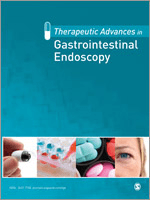
Therapeutic Advances in Gastrointestinal Endoscopy
Unlocking New Possibilities in Gastrointestinal MedicineTherapeutic Advances in Gastrointestinal Endoscopy, published by SAGE Publications Ltd in the United Kingdom, is a cutting-edge Open Access journal dedicated to the field of gastroenterology and advancing the practice of endoscopy through rigorous research and clinical innovation. Since its establishment in 2019, the journal has become an invaluable resource for researchers, clinicians, and students, providing a platform for the dissemination of high-quality studies and novel therapeutic techniques. With an impressive Q2 ranking in the Gastroenterology category and a current Scopus rank of #63/167, it reflects the journal's commitment to fostering academic excellence and impactful research. The journal aims to enrich the field by sharing significant findings that improve patient outcomes and advance the knowledge of gastrointestinal procedures. The adoption of an Open Access model ensures that research is accessible to a global audience, thereby facilitating knowledge exchange and collaboration within the gastroenterology community.
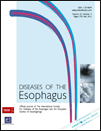
DISEASES OF THE ESOPHAGUS
Connecting research and practice for better esophageal care.DISEASES OF THE ESOPHAGUS is a prestigious, peer-reviewed journal published by Oxford University Press Inc, focusing on the clinical and translational aspects of esophageal diseases. With an ISSN of 1120-8694 and an E-ISSN of 1442-2050, this journal has cultivated a reputation for excellence since its inception in 1988. Its impact is underscored by its prestigious Q1 ranking in both Gastroenterology and Medicine (miscellaneous) categories as of 2023, positioning it among the top tier of journals within these fields. The journal's scholarly contributions span a wide range of topics relevant to researchers, healthcare professionals, and clinical practitioners, emphasizing advancement in diagnosis and treatment of esophageal conditions. Although currently not an open-access journal, its content is widely accessible through institutional libraries, ensuring that valuable research reaches the hands of those dedicated to enhancing patient care. As it continues publishing through 2024, DISEASES OF THE ESOPHAGUS remains an essential resource for those engaged in understanding and managing esophageal health.

International Journal of Gastrointestinal Intervention
Transforming Gastrointestinal Care with Cutting-edge StudiesInternational Journal of Gastrointestinal Intervention is a distinguished open-access journal published by the SOC GASTROINTESTINAL INTERVENTION that has been committed to disseminating critical research since its inception in 2012. Based in the Netherlands, this journal focuses on the dynamic fields of gastroenterology, hepatology, oncology, and radiology, offering a platform for innovative studies and clinical interventions that can significantly impact patient care and medical practice. With its incorporation into Scopus and ranked within the lower quartiles in various categories as of 2023, the journal acknowledges the evolving landscape of medical research and seeks to continually elevate its contributions to knowledge in these specialized areas. By embracing open access since its founding, the journal ensures that cutting-edge research findings are accessible to a global audience, fostering collaboration and knowledge sharing among researchers, professionals, and students. The journal aims to be a premier source of information and a catalyst for advancements in gastrointestinal interventions, making it an essential resource for those dedicated to improving health outcomes in these critical medical fields.
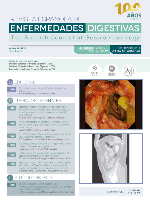
REVISTA ESPANOLA DE ENFERMEDADES DIGESTIVAS
Pioneering research for a healthier digestive future.REVISTA ESPANOLA DE ENFERMEDADES DIGESTIVAS, a pivotal Open Access journal published by ARAN EDICIONES, S A, has been at the forefront of advancing the field of gastroenterology since its inception in 1990. With a robust commitment to disseminating high-quality research, the journal provides a platform for researchers, clinicians, and students to share innovative findings and insights concerning digestive diseases. The journal is characterized by its Q3 ranking in both Gastroenterology and Miscellaneous Medicine categories, indicative of its significant contributions to these fields, and is positioned within the 36th percentile of Scopus rankings for medicine related to gastroenterology. Based in Spain, REVISTA ESPANOLA DE ENFERMEDADES DIGESTIVAS has embraced the Open Access model since 2004, ensuring that its articles are readily available to a global audience without financial barriers. The journal not only supports academic discourse but also plays a crucial role in improving clinical practices and health outcomes related to digestive health.
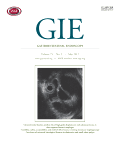
GASTROINTESTINAL ENDOSCOPY
Unveiling Breakthroughs in Endoscopic TechnologyGASTROINTESTINAL ENDOSCOPY, published by MOSBY-ELSEVIER, stands as a leading journal in the fields of gastroenterology and radiology, boasting an impressive impact factor that reflects its esteemed position within the academic community. Established in 1965 and set to continue through 2024, this journal is critical for disseminating high-quality research that informs clinical practice and enhances patient care. With a robust Scopus ranking — 25th out of 333 in Radiology, Nuclear Medicine and Imaging, and 15th out of 167 in Gastroenterology — it proudly maintains a #1 quartile status in both disciplines as of 2023. While the journal does not offer open access, it remains invaluable for researchers, professionals, and students seeking to stay ahead in the rapidly evolving fields of gastrointestinal pathology and innovative endoscopic procedures. Its comprehensive scope encompasses technological advancements, clinical studies, and critical reviews, making it a vital resource for advancing knowledge and supporting professional development.

World Journal of Gastrointestinal Endoscopy
Connecting Researchers and Clinicians for Better OutcomesWorld Journal of Gastrointestinal Endoscopy, an esteemed publication under the BAISHIDENG PUBLISHING GROUP INC, plays a pivotal role in advancing the field of gastroenterology through its dedicated focus on cutting-edge research and innovative practices in gastrointestinal endoscopy. With a commitment to facilitating the dissemination of knowledge, this journal seeks to provide a platform for researchers, clinicians, and academic professionals to share their findings and insights into the latest endoscopic techniques, technologies, and applications. The journal aims to foster collaboration and improve patient outcomes through rigorous peer-reviewed articles that encompass a broad range of topics within gastrointestinal endoscopy. With its impact on shaping clinical practices and influencing future research directions, the World Journal of Gastrointestinal Endoscopy is an essential resource for anyone in the field, remaining accessible through various academic channels, including institutional libraries and individual subscriptions.

DIGESTION
Connecting researchers with groundbreaking discoveries in digestion.DIGESTION is a prestigious journal dedicated to advancing the field of gastroenterology, published by KARGER, a renowned publisher based in Switzerland. With a rich history dating back to 1896, this journal has continuously evolved and serves as a vital platform for researchers, professionals, and students alike. DIGESTION is recognized for its scholarly contributions, holding an impressive rank of 23 out of 167 in the Scopus database, placing it within the top 14% of gastroenterology journals, as evidenced by its Q2 classification. The journal's commitment to high-quality research is reflected in its wide-ranging scope, addressing various aspects of digestive health, clinical practices, and innovative therapies. Though not an open-access journal, it provides comprehensive access options that ensure the dissemination of crucial research findings to the global community. As we move towards 2024, DIGESTION continues to facilitate dialogue and insights in gastroenterological research, making it an indispensable resource for those in the field.
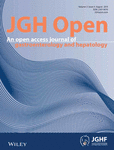
JGH Open
Pioneering Open Access in Gastroenterology and HepatologyJGH Open is a prominent open-access journal dedicated to advancing knowledge in the fields of Gastroenterology and Hepatology, published by WILEY. Since its inception in 2017, the journal has served as a crucial platform for researchers, professionals, and students to disseminate innovative research findings and clinical insights. With an impact factor and Scopus rankings reflecting its steady growth—ranking in the 3rd quartile for both Gastroenterology (Q3) and Hepatology (Q3)—JGH Open is positioned within the competitive landscape of medicine. Its commitment to open access enhances the visibility and accessibility of high-quality research, ensuring that significant advancements in understanding diseases of the gastrointestinal tract and liver reach a broad audience. With a focus on collaboration and dissemination of knowledge, JGH Open aims to contribute to the global discourse and improve outcomes in gastrointestinal health.

PRACTICAL GASTROENTEROLOGY
Advancing Gastrointestinal Insights for PractitionersPRACTICAL GASTROENTEROLOGY is a distinguished journal dedicated to the field of gastroenterology, published by Shugar Publishing Inc in the United States. With an ISSN of 0277-4208, the journal serves as a pivotal resource for medical professionals, researchers, and students keen on staying abreast of the latest advancements and practical applications in gastrointestinal health. Although it does not currently operate under an Open Access model, it has been a respected publication since its inception, spanning significant years of research from 1989 to 2013 and resuming again from 2016 to 2023. Despite holding a current Q4 ranking in Gastroenterology with Scopus, its commitment to quality insights provides a platform for critical information dissemination, making it an essential read for those engaged in clinical practice and academic research. The journal’s objectives include addressing practical challenges in gastroenterology, bridging the gap between research and clinical implementation, and fostering ongoing education among practitioners in this dynamic field.

Techniques and Innovations in Gastrointestinal Endoscopy
Elevating Endoscopy: Techniques that Make a DifferenceTechniques and Innovations in Gastrointestinal Endoscopy, a distinguished publication by ELSEVIER SCIENCE INC, serves as a vital resource in the fields of Gastroenterology and Radiology. Established in 2020, this journal is committed to disseminating pioneering research and novel techniques that advance the practice of gastrointestinal endoscopy. With an ISSN of 2666-5107 and an E-ISSN of 2590-0307, it is positioned at the forefront of medical literature, boasting significant rankings within its categories—Q3 in Gastroenterology and Q2 in Radiology, Nuclear Medicine and Imaging as of 2023. Aimed at researchers, practitioners, and students alike, the journal highlights innovations and clinical applications, providing an open forum for the exchange of cutting-edge knowledge. Though it currently operates under a traditional access model, its growing relevance and comprehensive coverage of gastrointestinal techniques make it essential reading for professionals focused on enhancing patient outcomes through advanced endoscopic procedures.